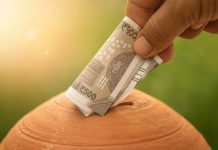The pound sunk lower across the previous week, its third consecutive week of falls. The increased threat of pro- Brexit Boris Johnson winning the UK Conservative leadership challenge and becoming prime minister, sent the pound tumbling versus the US dollar. These losses were extended on Monday in the wake of the European Parliamentary elections. The pound US dollar exchange rate closed down 0.3% at US$1.2681.
| What do these figures mean? |
|---|
|
When measuring the value of a pair of currencies, one set equals 1 unit and the other shows the current equivalent. As the market moves, the amount will vary from minute to minute. For example, it could be written: 1 GBP = 1.28934 USD Here, £1 is equivalent to approximately $1.29. This specifically measures the pound’s worth against the dollar. If the US dollar amount increases in this pairing, it’s positive for the pound. Or, if you were looking at it the other way around: 1 USD = 0.77786 GBP In this example, $1 is equivalent to approximately £0.78. This measures the US dollar’s worth versus the British pound. If the sterling number gets larger, it’s good news for the dollar. |
Nigel Farage’s Brexit party was the standout winner in the UK for the European Parliamentary election. Support for the Labour party and Conservatives collapsed, whilst the Liberal Democrats also did well. Votes are sitting between two parties, one that supports Brexit and one that is in favour of a second referendum. With a country that remains so deeply divided over Brexit, the chances of a compromise being reached in Westminster looks highly unlikely.
Following from Nigel Farage’s victory, Eurosceptic Conservatives will be scrambling to put a leader in power that will take the UK out of the European Union at the end of October with or without a Brexit deal. According to economists and business leaders, this is not pound favourable. In Europe a strong performance by the pro-EU parties means that hopes of changes to the current negotiated Brexit deal have been dashed.
| Why is a “soft” Brexit better for sterling than a “hard” Brexit? |
|---|
| A soft Brexit implies anything less than UK’s complete withdrawal from the EU. For example, it could mean the UK retains some form of membership to the European Union single market in exchange for some free movement of people, i.e. immigration. This is considered more positive than a “hard” Brexit, which is a full severance from the EU. The reason “soft” is considered more pound-friendly is because the economic impact would be lower. If there is less negative impact on the economy, foreign investors will continue to invest in the UK. As investment requires local currency, this increased demand for the pound then boosts its value. |
With the UK conservative leadership battle set to run until late July, the prospects of any political clarity remain limited.
Dollar Supported By Safe Haven Status Ahead Of Busy Week
The US dollar managed a broadly firmer finish in the previous week owing to its safe haven status. Investors continued to buy into the dollar as US — Sino trade tensions escalated. However, dismal pmi figures for both manufacturing and services, with both barely achieving expansion acted as a drag on the dollar. The data points to slowing economic activity as the US — Sino trade dispute rolls on.
After weak figures last week, investors will look ahead to this week’s’ US GDP reading on Thursday. Analysts are forecasting that it will tick lower to 3.1%, down from 3.2%. Following the GDP reading, investors will look to US inflation as measured by PCE. Analysts are expecting this to stay at a 19-month low of 1.6%. These numbers could encourage investors to sell out of the US dollar as the Fed are unlikely to hike rates amid falling growth and low inflation.
| Why do raised interest rates boost a currency’s value? |
|---|
| Interest rates are key to understanding exchange rate movements. Those who have large sums of money to invest want the highest return on their investments. Higher interest rate environments tend to offer higher yields. So, if the interest rate or at least the interest rate expectation of a country is relatively higher compared to another, then it attracts more foreign capital investment. Large corporations and investors need local currency to invest. More local currency used then boosts the demand of that currency, pushing the value higher. |
This publication is provided for general information purposes only and is not intended to cover every aspect of the topics with which it deals. It is not intended to amount to advice on which you should rely. You must obtain professional or specialist advice before taking, or refraining from, any action on the basis of the content in this publication. The information in this publication does not constitute legal, tax or other professional advice from TransferWise Inc., Currency Live or its affiliates. Prior results do not guarantee a similar outcome. We make no representations, warranties or guarantees, whether express or implied, that the content in the publication is accurate, complete or up to date. Consult our risk warning page for more details.
This article was initially published on TransferWise.com from the same author. The content at Currency Live is the sole opinion of the authors and in no way reflects the views of TransferWise Inc.





